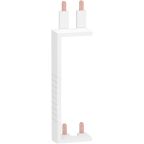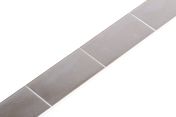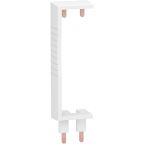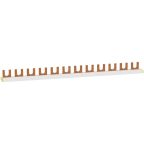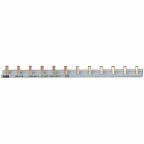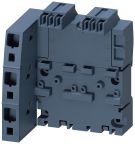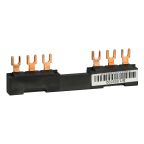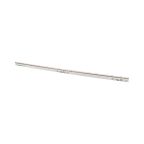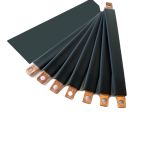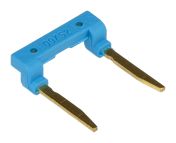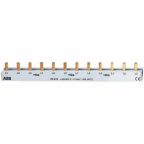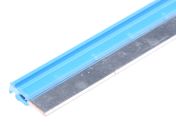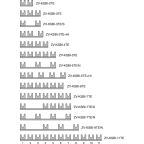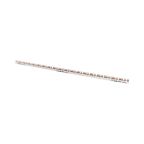Busbars
Busbars are critical components in modern electrical power distribution systems, offering a clever solution to make complex power distribution easier. Widely used in industrial automation, commercial buildings, battery systems, and electrical panels, electrical busbars come in various forms such as solid bars, flat strips, or insulated combs.
For B2B buyers in Australia, utilising busbars offers significant advantages such as space savings within electrical enclosures, a reduction in complex cabling, easier and faster installation processes, and improved maintenance efficiency.
Uses of Busbars
Busbars play a fundamental role in power distribution and electrical panel setups by providing a central and efficient means of connecting multiple incoming and outgoing electrical circuits. Their design simplifies complex wiring and ensures a reliable pathway for electrical current.
Role of Busbars in Electrical Systems
Busbars serve as central conductors that effectively distribute electrical current across multiple circuits within a system. Incoming power from the main supply is connected to the busbar, and then various outgoing circuits are tapped off the busbar to feed different loads or components. This centralised distribution method streamlines the electrical system, reducing the need for extensive point-to-point wiring.
Busbars are commonly found in critical power distribution units (PDUs), control panels that manage industrial machinery, high and low-voltage switchgear that protects and isolates electrical equipment, and circuit breaker systems.
Types of Busbars Available
Busbars are manufactured in various configurations and materials to suit a wide range of electrical distribution needs.
Copper Busbars
This type of busbar is generally used for high-current applications due to its excellent electrical conductivity. Typically found inside industrial switchgear and control panels, busway enclosures, and larger panel boards. They can also be used to connect high-voltage equipment. Ideal for high conductivity and current-carrying capacity. Common in high-load industrial panels, renewable energy, and critical infrastructure.
Aluminium Busbars
Aluminium busbars are an alternative to copper busbars, offering lower cost and lighter weight. They are often used in applications where weight reduction is critical, such as in large-scale power transmission systems. Lightweight, cost-effective alternative to copper. Suitable for medium-load applications and space-sensitive enclosures.
Flexible Busbars
These busbars are made of multiple thin copper strips or braided conductors, allowing them to bend and flex. They are used in applications where movement or vibration is present, such as in electric vehicles or machinery. Made with layered laminated copper or aluminium. Perfect for tight spaces and vibration-prone environments like EVs, battery packs, and modular systems.
Insulated Busbars
Insulated busbars have an insulating material covering or coating, such as PVC (Polyvinyl Chloride) or epoxy, to provide electrical insulation and protect against accidental contact. They are commonly used in switchgear and panel boards. Encapsulated in epoxy or PVC for safety and compactness. Used in dense electrical panel installations to prevent accidental contact and arc faults.
Electrical Busbars
Electrical busbars serve as versatile general-use conductors. Commonly found within switchboards, motor control centres (MCCs), and low-voltage distribution panels, these busbars facilitate the efficient and organised distribution of electrical power to various circuits and equipment. Their robust design and reliable conductivity ensure consistent performance in numerous applications.
Power Busbars
Power busbars are specifically engineered for heavy-duty current transmission. Designed to handle significant electrical loads, these busbars are crucial for ensuring the reliable and efficient transfer of power from primary sources to downstream equipment. Power busbars are essential components in substations, large-scale manufacturing facilities, and critical infrastructure where uninterrupted power flow is paramount.
Battery Busbars
Battery busbars are tailored for use in modern energy storage systems, including solar battery installations and uninterruptible power supply (UPS) setups. These specialised busbars are designed to efficiently conduct current between individual battery cells or modules, facilitating the charging and discharging processes within the battery system.
Circuit Breaker Busbars
Circuit breaker busbars are specifically designed to facilitate the connection and mounting of multiple circuit breakers within electrical panels and switchboards. They often feature pre-drilled holes or slots to accommodate standard circuit breaker footprints, simplifying installation and ensuring proper spacing and alignment.
Key Factors to Consider When Choosing Busbars
Selecting the right busbars is crucial for ensuring the safety, efficiency, and reliability of your electrical power distribution system. Carefully considering the following factors will help you make an informed decision.
- Current Rating And Voltage Requirements: The busbar must be capable of safely and efficiently carrying the maximum anticipated current within your system's specified voltage.
- Material Selection: Copper offers excellent electrical conductivity, making it ideal for high-current applications, while aluminium provides a lighter and more cost-effective alternative for medium-current needs.
- Thermal Performance And Insulation: The busbar's ability to dissipate heat and the effectiveness of its insulation are vital for preventing overheating, ensuring safety, and prolonging the lifespan of the electrical installation.
- Form Factor And Mounting Style: The physical shape and how the busbar is designed to be mounted must be compatible with the dimensions and configuration of your busbar electrical panels or enclosures.
- Application-Specific Needs: Consider the unique demands of your specific application, such as the requirements for battery systems, modular switchgear, or distribution boards.
Mistakes to Avoid when Buying Busbars
Carefully considering your busbar selection is essential to prevent costly errors and ensure the safety and efficiency of your electrical power distribution system. Here are some common mistakes to avoid:
- Overlooking Current Capacity: Selecting busbars with an insufficient current rating can lead to overheating, system inefficiency, and potential safety hazards.
- Ignoring Insulation Requirements: In densely packed electrical enclosures, neglecting proper insulation on busbars increases the risk of short circuits and arc faults.
- Busbar Incompatibility: Incompatibility between the busbar configuration and the circuit breaker or panel design can result in installation difficulties, improper connections, and compromised system functionality.
- Not Accounting For Future Load Expansion: Failing to consider potential increases in power demand or the need for future system modifications can necessitate costly replacements or rework.
Common Applications of Busbars
Busbars are versatile components found across a wide range of industries, playing a crucial role in efficient and reliable power distribution. Here are some common applications:
- Manufacturing: Busbars are integral in the power distribution within automated assembly lines, robotic systems, and control panels that manage individual production units.
- Process Manufacturing: In industries dealing with continuous production like chemical processing or food and beverage, busbars ensure reliable power supply to processing equipment, motor control centres, and distribution boards.
- Energy and Utilities: Busbars are critical components in power generation plants, substations, and distribution networks for the efficient transmission and distribution of electrical power.
- Logistics: Within large buildings, warehouses, and logistics centres, busbars are used in main distribution boards, lighting systems, and power supply for material handling equipment like conveyors and automated guided vehicles.
Your Trusted Busbars Supplier & Manufacturer
RS Australia is your trusted supplier and distributor of a comprehensive range of high-quality busbars from leading manufacturers such as Eaton, Siemens, and Schneider Electric. Our selection prioritises product quality, adherence to industry compliance standards, and reliable performance. Explore our extensive online catalogue to find the perfect busbars, cartridge fuses, and fuse replacement kits for your needs.
To place an order, simply browse our selection, add the desired busbars to your cart, and proceed through our secure checkout. We offer various payment options for your convenience across Australia. For detailed information on delivery timelines and costs within Australia, please visit our dedicated Delivery Information page.
